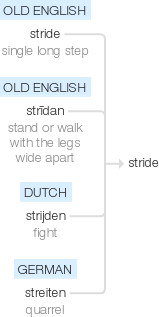Stride
Old English stride (noun) ‘single long step’, strīdan (verb) ‘stand or walk with the legs wide apart’, probably from a Germanic base meaning ‘strive, quarrel’; related to Dutch strijden ‘fight’ and German streiten ‘quarrel’.
wiktionary
From Middle English striden, from Old English strīdan(“to get by force, pillage, rob; stride”), from Proto-Germanic *strīdaną. [1] Cognate with Low German striden(“to fight, to stride”), Dutch strijden(“to fight”), German streiten(“to fight, to quarrel”).
From Middle English stride, stryde, from Old English stride(“a stride, pace”), from the verb (see above). Doublet of strid.
etymonline
stride (v.)
Old English stridan (past tense strad, past participle striden), "to straddle, mount" (a horse), from Proto-Germanic *stridanan (source also of Middle Low German strede "stride, strive;" Old Saxon stridian, Danish stride, Swedish strida "to fight," Dutch strijden, Old High German stritan, German etreiten "to fight, contend, struggle," Old Norse striðr "strong, hard, stubborn, severe").
The sense connection in the various Germanic forms is perhaps "strive, make a strong effort;" the senses having to do with walking and standing are found only in English and Low German. Meaning "to walk with long or extended steps" is from c. 1200. Cognate words in most Germanic languages mean "to fight, struggle;" the notion behind the English usage might be the effort involved in making long strides, striving forward.
stride (n.)
"a step in walking," especially a long one, from Old English stride "a stride, a step," from the root of stride (v.). Compare Dutch strijd, Old High German strit, German Streit "fight, contention, combat," Swedish and Danish strid "combat, contention." From c. 1300 as a measure of distance roughly the length of a stride. Figurative meaning "advance rapidly, make progress" is from c. 1600. Of animals (especially horses) from early 17c. To take (something) in stride (1832), i.e. "without change of gait," originally is of horses leaping hedges in the hunting-field; figurative sense attested from 1902. To hit (one's) stride is from horse-racing. Jazz music stride tempo is attested from 1938. Meaning "a standing with the legs apart, a straddle" is from 1590s.
